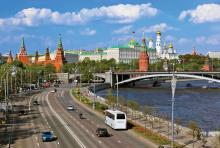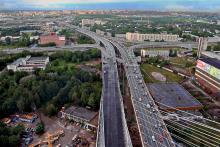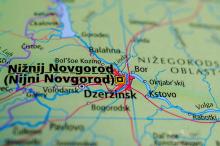The Russian road building industry is on the verge of big changes as it bids to improve quality and speed of construction says Eugene Gerden The Russian road building industry is on the verge of big changes as the national government considers creating conditions to attract foreign companies to build roads in the country. According to a recent order of President Vladimir Putin, due to poor quality and high cost of road construction, there is a need for the development of a mechanism to attract foreign compa

Construction work on the Moscow-Saint Petersburg motorway
The Russian road building industry is on the verge of big changes as it bids to improve quality and speed of construction says Eugene Gerden
The Russian road building industry is on the verge of big changes as the national government considers creating conditions to attract foreign companies to build roads in the country.According to a recent order of President Vladimir Putin, due to poor quality and high cost of road construction, there is a need for the development of a mechanism to attract foreign companies to invest in domestic road building by inviting them to participate in state tenders for road construction.
The cost of road construction in Russia is the most expensive in the world, but under the government’s plans nearly 500 billion rubles (US$16.6 billion) of private money is expected to be invested in road building in the coming years, part of which will be provided by foreign investors.
Until recently, foreign companies were reluctant to participate in such tenders due to low profits associated with the implementation of such projects, and high taxes.
In addition, traditional Russian bureaucracy and the need to receive a large number of different approvals has also been one of the factors that prevented the expansion of foreigners to Russia.
Outdated Russian legislation in the field of road building has also deterred foreigners investing in the Russian road building sector.
To date, most foreign companies prefer to participate in such projects as sub-contractors, being responsible for some stages of the project, such as feasibility study, but not as general contractors.
An initiative to create the most favourable conditions for road construction by foreign investors, under the personal supervision of Vladimir Putin, should be approved by 1 December, 2012.
This is expected to occur within the state programme for road construction, which involves the construction of 120,000km of new roads (18,000km federal) by 2020. In addition, the project involves the modernisation of federal highways.
The construction of new roads using the latest technologies, provided by foreign companies, is necessary for Russia, given that the country’s road network was built in 1960-1970s, and is not designed for the volume of traffic it now carries.
Many opinion polls show that the bad condition of Russian roads remains one of the major concerns of Russian citizens and in particular drivers, especially due to the fact that the number of cars in the country over the past ten years has doubled to 40 million.
According to the
Currently, the average rate of cargo transportation in Russia does not exceed 280-300km/day: in the
In accordance with Putin’s order, the Russian government plans to make changes to the numerous legal documents regulating the construction of roads in Russia, including numerous national state standards and building codes, which are archaic and non-compliant with modern construction standards.
It is planned that foreign companies winning tenders will sign life-cycle contracts with the Russian Ministry of Transport, and will be responsible for the quality of their roads. The guarantee rate for road work in Russia will increase from the current 1-3 years to 7-10 years, similar to the US, EU and China.
Of potential interest to foreign investors may be the large road building projects being planned in the coming years. Among these are construction of the Ural Highway (connecting Moscow, Nizhny Novgorod, Kazan and Yekaterinburg); reconstruction of some major southern tracks such as the Caspian Sea, Caucasus and Don roads, as well as entrances to some seaports.
So far, the Moscow-Saint Petersburg toll motorway is the largest road building project in Russia being implemented with the participation of foreign investors, including French company
Russian analysts believe that President Putin’s initiative will accelerate the implementation of this project and help to attract other foreign companies to build roads in Russia.
To date, interest in building roads in Russia has been expressed by a number of Finnish and Chinese companies.
According to Konstantin Timofeyev, head of Moskomstroyinvest, the Department of Construction of the Moscow Government, there is a possibility of the participation of the Development Bank of China (together with a number of large Chinese companies) in certain projects, particularly the construction of roads in Moscow.
The Russian Ministry of Transport believes the attraction of foreign companies will help to significantly improve the quality of roads in Russia and will help to reduce production costs.
It is claimed that the cost of road construction in Russia is 2.6 times higher than in Europe, three times higher than in the US and seven times higher than in China.
For example the construction of the Krasnodar-Novorossiysk Highway, one of the most important highways for the Sochi Winter Olympics in 2014, is currently estimated at $32 million/km. Construction of the Western High Speed Diameter near Saint Petersburg is about $180 million/km, while some areas of the Moscow Fourth Ring Road is up to $400 million/km.
According to experts in the World Bank, the repair and overhaul of roads is in the range of $27,000-55,000/km, which is almost three times higher than in Finland, which has the same climatic conditions as Russia.
In order to prevent abuses during the tenders of granting the contracts, there are plans to introduce prior public discussion of contracts valued at over RUB 1 billion. In addition technology and price auditing are expected to be applied to all major investment projects with state and foreign participation.
At the same time, despite the attempts of the Russian government to significantly improve the investment climate in the field of domestic road building, certain problems may prevent the expansion of foreign companies into the Russian road building market, among which is the under-development in the local market of road construction, in comparison with those in China and the US; lack of adequate legislation; poor quality of construction materials and high level of alleged corruption and monopolisation.
In the case of poor building materials, at present the majority of road building companies are unhappy with the quality of bitumen, according to Igor Levitin, a former Minister of Transport.
Another problem in the Russian road building industry is the low rates of construction, which are significantly lower the rates of construction in the US and China.
However, most of the Russian analysts have welcomed the new state initiatives, believing that their implementation will help to significantly improve the current situation in the Russian road industry.
Alex Kichatov, CEO of City Express, one of Russia’s largest courier companies, says: “This is a very good initiative, the implementation of which may change the current situation with roads in Russia. However, much will depend on the structure of future tenders and their honesty, which means the prohibition of lobbying of interests of certain companies. In this case, the company which wins a tender will make every effort to carry out the project with quality and in a timely manner.”
The same opinion is shared by Yefim Basin, president of the National Association of Builders, who believes that the attraction of foreign companies with their financial resources and experience will help the domestic road builders to adopt modern technologies for road building.
“The attracting of foreign companies will increase competition in the Russian road building market to improve the quality of construction works, and will bring us new technologies and materials. The scope of work is huge and there will be enough orders for everyone. The annual demand for road building in Russia is 1,000-1,500km,” says Basin.
However at present the annual rate of road building in Russia is estimated at only 200km, compared to 20,000km in China. There are more than 70,000 areas and districts in Russia which are not connected by roads.
But, as part of Russia’s planned economic development, by 2025 the length of roads in Russia should be at least double.









